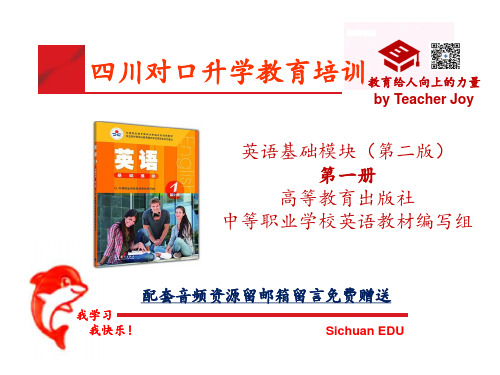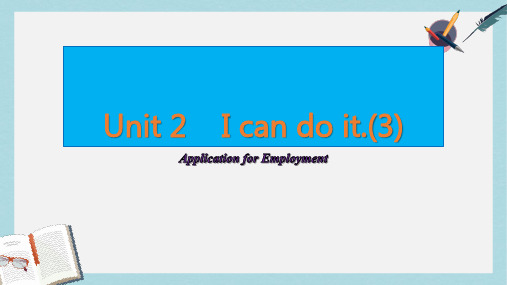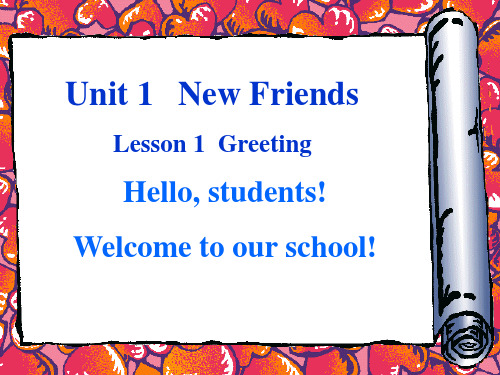高教版职高英语1(基础模块)Unit1PPT课件
合集下载
中职英语基础模块unit 1PPT课件

5 Little Tom can’t remember new words he has learnt.
第14页/共44页
Dialogue
(R=Ralph, J=Julie) R: Hi, Julie! I’ve heard that you are good at English. So please do me a favor, will you? J: Of course. What’s the matter? R: I am poor in English learning and I don’t know how to improve it. Could you give me some advice? J: Sure. Let’s start from pronunciation. How about your pronunciation? R: It’s too bad and is really my big headache. I can’t make myself understood by foreigners. J : That’s because your pronunciation is not correct. You can listen to some English songs and learn to sing them. It may help a lot. R: That sounds great. I’ll try. Thanks a lot. J : Don’t mention it.
Good cookies could be cooked by a good cook, if a good cook could cook good cookies. I don't know why Joan showed a yellow coat to the goat in the snow. Tom has got a lot of dots on his pocket. If he wants to wash off the dots, he will use a pot of hot water.
第14页/共44页
Dialogue
(R=Ralph, J=Julie) R: Hi, Julie! I’ve heard that you are good at English. So please do me a favor, will you? J: Of course. What’s the matter? R: I am poor in English learning and I don’t know how to improve it. Could you give me some advice? J: Sure. Let’s start from pronunciation. How about your pronunciation? R: It’s too bad and is really my big headache. I can’t make myself understood by foreigners. J : That’s because your pronunciation is not correct. You can listen to some English songs and learn to sing them. It may help a lot. R: That sounds great. I’ll try. Thanks a lot. J : Don’t mention it.
Good cookies could be cooked by a good cook, if a good cook could cook good cookies. I don't know why Joan showed a yellow coat to the goat in the snow. Tom has got a lot of dots on his pocket. If he wants to wash off the dots, he will use a pot of hot water.
中职高教版英语1基础模块

the usage of“be”verb.
a personal name cardanddescribetheoccupationof others.
教学内容题 目
职业岗位知识点、能力点
与基本职业素质点
目标水平
识记
理解
熟练操作
应用
分析
Readingand Writing
知识点:Masterthegrammar structure Verb“be”pronouns.
【主要教学内容】
Content:
the words about name card and vocation.eg:telephone number; age; address; e-mail address; job (engineer; manager; secretary; teacher; student; doctor; nurse; singer; fans); position(boss)
2)about greeting:Good to meet you.
3)about personal information:What’s you name Where are you from Which company are you from
designpersonalname card.
【主要能力点与知识点应达到的目标水平】
the meaning of“last name”and“first name”.
9. Read and underline. Practice the dialogue with your partner and underline the sentences aboutasking one’s personal information.
a personal name cardanddescribetheoccupationof others.
教学内容题 目
职业岗位知识点、能力点
与基本职业素质点
目标水平
识记
理解
熟练操作
应用
分析
Readingand Writing
知识点:Masterthegrammar structure Verb“be”pronouns.
【主要教学内容】
Content:
the words about name card and vocation.eg:telephone number; age; address; e-mail address; job (engineer; manager; secretary; teacher; student; doctor; nurse; singer; fans); position(boss)
2)about greeting:Good to meet you.
3)about personal information:What’s you name Where are you from Which company are you from
designpersonalname card.
【主要能力点与知识点应达到的目标水平】
the meaning of“last name”and“first name”.
9. Read and underline. Practice the dialogue with your partner and underline the sentences aboutasking one’s personal information.
高教版职高英语基础模块课件演示文稿

Tick the activities you did before.
stomachache cough
toothache headache
fever back pain
_s_t_o_m__a_c_h_a_ch__e___
第7页,共69页。
Tick the activities you did before.
1. Bob: a terrible toothache, a week
Doctor not serious, brush teeth, eat less sweets, take the : medicine twice a day
2. Eva: cough, feel cold, one day
高教版职高英语基础模块课件 演示文稿
第1页,共69页。
(优选)高教版职高英语基础 模块课件.
第2页,共69页。
第3页,共69页。
第4页,共69页。
Find the right words for the pictures.
stomachache cough
toothache headache
第25页,共69页。
Read and fill in the forms.
The last was Henry. He hurt his left foot during a football match. Dr. Smith asked
him to lie down and put an ice bag on his foot. Henry felt much better. Dr. Smith smiled, “OK, go home and use ice on your foot for 5 minutes each hour for the first 2 days. Stay in bed for a week.”
职高英语基础模块1LessononeNicetomeetyou

Vocabulary examples
"apple", "banana", "cat", etc
Grammar examples
present simple tense ("I eat an apple"), past particle ("I have eaten an apple"), past voice ("The apple was eaten by me"), etc
Common expressions
"How are you?", "What's up?", "See you later!", etc
Sentence pattern examples
"I am (subject) (predict)", "He likes (object)", "She is (objective)", etc
basic
paragraphs in English
Learning experience sharing
Differentials accounted for
Some students found it challenging to remember new words and grammar structures
01
Course Introduction
Course objectives
To develop students' basic English language skills in listening, speaking, reading, and writing
中职英语英语课件第一册unit1nicetomeetyou

我快乐!
n. n. n. n. adj. n.
公司 经理 秘书 病人 职业的 护士 名片 职业学校
Sichuan EDU
四川对口升学教育培训
(
) Hi, Jenny!
(
) Hi, Miss Brown!
(
) Good morning, Miss Jenny Brown!
我学习 我快乐!
Sichuan EDU
我学习 我快乐!
F. Hi, George! ____________________________
Sichuan EDU
四川对口升学教育培训
Dialogue
Question 1: What does “last name” mean in Chinese? “Last name” means “姓” in Chinese.
我学习 我快乐!
E_._H__e_ll_o_, _M__r._J_o_h_n__so_n_!____________
Sichuan EDU
四川对口升学教育培训
A. Good morning, Mr. Brown! B. Good afternoon, Ms. Smith! C. Good evening, Jenny! D. Hi, Mary! E. Hello, Mr. Johnson! F. Hi, Geroge!
Question 2: What is the last name of an English name? The last name is the last part of an English name.
我学习 我快乐!
Sichuan EDU
四川对口升学教育培训
我学习 我快乐!
n. n. n. n. adj. n.
公司 经理 秘书 病人 职业的 护士 名片 职业学校
Sichuan EDU
四川对口升学教育培训
(
) Hi, Jenny!
(
) Hi, Miss Brown!
(
) Good morning, Miss Jenny Brown!
我学习 我快乐!
Sichuan EDU
我学习 我快乐!
F. Hi, George! ____________________________
Sichuan EDU
四川对口升学教育培训
Dialogue
Question 1: What does “last name” mean in Chinese? “Last name” means “姓” in Chinese.
我学习 我快乐!
E_._H__e_ll_o_, _M__r._J_o_h_n__so_n_!____________
Sichuan EDU
四川对口升学教育培训
A. Good morning, Mr. Brown! B. Good afternoon, Ms. Smith! C. Good evening, Jenny! D. Hi, Mary! E. Hello, Mr. Johnson! F. Hi, Geroge!
Question 2: What is the last name of an English name? The last name is the last part of an English name.
我学习 我快乐!
Sichuan EDU
四川对口升学教育培训
我学习 我快乐!
中职英语基础模块上册unit1(完整版)

a pat on the back
a hug
拥抱:在欧美、中东及南美洲常见的礼节, 一般用于熟人和朋友之间,有时伴随着接吻礼, 是比较亲密的一种见面礼仪。这种礼仪一般用 于同性或者亲密的异性之间。
1.w_______ (欢迎) 2. v _______ (职业的) 3. g_______ (高兴的) 4. m________(遇见,汇合,迎接) 5. l______(看,瞧,看起来,显得... ) 6. c______ (教室) 7. b________ (建筑物,楼房) 8. l________ (实验室) 9. f_____(楼层,地板) 10. l________ (大的) 11. b_______ (明亮的) 12. c__(班级,课节)
❖every
❖ adj. 每一个;每个
❖love
❖ v.热爱;爱好
❖hard
❖ adv.努力地;adj.硬的;难的
❖thank
❖ v./n.感谢
thank …for… 为…而感谢…
例句:谢谢你的帮助。eg. Thank you for your help.
❖visit ❖time ❖English ❖want ❖desk ❖chair
a bow
鞠躬:日本是一个极其注重礼节的国家,见面时一般 都要互相问候,脱帽鞠躬,眼睛向下,表示诚恳的态度。 日本妇女温柔体贴,每天鞠躬无数次,对男子亦十分尊 重。除了日本之外,朝鲜人见面也行鞠躬礼。
a kiss on the cheek
接吻礼:接吻礼是西欧流行在亲人、朋友、夫妻之间的 亲昵礼节,一般只能在受礼者脸颊上轻吻一下,不能发出声 音。感情激烈时,比如说遇到喜事或丧事,也可以使用接吻 礼,表示兴奋或者安慰、同情。
高教版中职英语(基础模块 第1册)Unit 2《I can do it》ppt课件1

Activity 12
Think and tick. 从下列条目中勾出你认为在求职申请表中 应包含的要素。
□ n□anmaeme
□pho□npehnounme bneurmber
□ a□gaege □ ambailiitl y
□ e-mail □ e-
□ address
□ f□amabilyility
Drive a car.
Read and tick. 勾出你认为求职需要具备的能力。
I can drive a car. I can swim.
I can play basketball I can sever visitors.
I can speak good English. I can love to work with others . I can use the computer very well.
Tang Hua: Ok. That’s it.
Wang Yang: Thank you.
Act and practice. 用下面的语句和信息模仿求职者进行面试。
WhaAt’: Ws yhoautr’nsaymoeu?r name? WhaAt’: Hs oyowuor lfdirsatrneaymoeu?/ last name? WheAre: Caraenyyoouufr…om? ?
在英语国家,年龄 (age) 是个敏 感的话题,除非确有需要,如填 写个人信息等,一般不要问成年
Tang Hua: Can you use the comp人u,te尤r其? 是成年女性的年龄。
Wang Yang: Yes, I can send a e-mail and play computer games.
中职英语基础模块1 UNIT1Unit1(Lesson1)

Dialogue B
• 1. Read and underline(问候句)
• 2. repeat the sentences
3.Try to get more sentences(问候)
• Glad to meet you • Nice to meet you • Pleased to meet you • Good to see you
• How do you do ?
4. Practice : ABAB型对话
A: … B: … A: … B: …
Tang Hua
Example
A: Hi! I’m XXX. B: Hi! I’m XXX A: Nice(Glad) to meet you./ How do you do?/
How are you?/ How are things? B: Nice(Glad) to meet you, too./ How do you do?
Unit 1 New Friends
Lesson 1 Greeting
Hello, students! Welcome to our school!
1. The teacher Introduces herself
2. and then asks some students to introduce
Assessment and reflection
1. I can say_____,_______,______,… 2. If I meet Sara Smith,I can say______or
______ 3. If I want to get more information I can
say_____,_______,__________, 4. I can introduce my friend_______________.
- 1、下载文档前请自行甄别文档内容的完整性,平台不提供额外的编辑、内容补充、找答案等附加服务。
- 2、"仅部分预览"的文档,不可在线预览部分如存在完整性等问题,可反馈申请退款(可完整预览的文档不适用该条件!)。
- 3、如文档侵犯您的权益,请联系客服反馈,我们会尽快为您处理(人工客服工作时间:9:00-18:30)。
• (很好/好/挺好的/棒极了/太好了/好得不得了/一般。)
• — Not bad. / The same as always. / I can’t complain.
• (还过得去/和以前一样/没什么可抱怨的/还过得去。)
• — Terrible. / Not good. I’ve had a headache all morning.
Dialogue A
Nice to meet you!
1
Activity 4
2
Activity 5
3
Activity 6
Activity 4
Listen and underline. 听录音,标出在活动3中用过的语句。
Mary:
Hi! I’m Mary.
Li Xiaonian: Hi, Mary! I’m Li Xiaonian.
• (难受极了。我整个早上都头痛。)
• 4. Jane: How’s it going?
•
Zhang Xiaobin: Fine. / Pretty good.
• 5. Jane: How’s everything with you?
• Zhang Xiaobin : So far so good.
Mary:
Nice to meet you.
Li Xiaonian: Nice to meet you, too.
(针对Dialogue A) (可用作dialogue A的补充对话, 同样用于学生见面寒暄,难 度稍大,可给程度好的学生补充)
• 1. Jane: Nice to meet you, I am Jane.
• Jane: Sure!
• 2. Jane: Good morning, Xiaobin. How are you today?
• Zhang Xiaobin: Pretty good, thanks. How about you?
• 3. Jane: How are you doing?
• Zhang Xiaobin: I’m doing fine / OK / pretty well / great /super / terrific / just so-so.
4.适用于有一阵子没见面的朋友
• How have you been? • 你过得怎么样?/最近还好吗?
• 5.适用于很久没见的朋友 • Long time no see! 好久不见!
Listening and speaking
1
Dialogue A
2Байду номын сангаас
Dialogue B
3
Everyday English
教学目标
语言知识目标: 学生能够理解并运用在不同场景下的简单问候语,能够使用be 动 词的一般现在时介绍个人及他人信息。 语言技能目标: 听 —— 学生能够听懂在不同场景下的简单问候语。 说 —— 学生能够在不同场景下用简单的问候语问候他人。 读 —— 学生能够读懂名片上的个人信息。 写 —— 学生能够根据个人情况做出自己的名片。 学 习 策 略: 学生学习将事物归类排序的能力。 文 化 意 识: 学生掌握中文人名与英美国家人名的不同排序规则。 情 感 态 度: 学生了解不同的职业,并初步确定自己的求职意向。 单 元 任 务: 学生能运用所学语言拟订自己未来的名片。
2.任何时候都可以用,但比较见外
• How are you?你好吗?
3.适用于第一次见面
Nice to meet you. 很高兴见到你。 How do you do. 你好!(比较正式,现在已较 少使用) 适用于曾经见过一面,但不太熟的人 Nice to see you again. 很高兴再次见到你。
Mary:
Nice to meet you.
Li Xiaonian: Nice to meet you, too.
Activity 5
Read and underline. 阅读上面对话,用下画线标出问候语。
Mary:
Hi! I’m Mary.
Li Xiaonian: Hi, Mary! I’m Li Xiaonian.
Hi, Jenny!
Activity 3
Act and practice. 看图,依据图中场景与同伴打招呼。
1
2
3
_______H_i,_J_e_n_n_y!_______ _G_o_o_d_a_f_te_r_n_oo_n_,_M_s__S_m_i_th_! __G_o_o_d_e_v_e_n_in_g_,_J_en_n_y_!_
• Zhang Xiaobin: Nice to meet you, Jane! My name is Zhang Xiaobin.
• Jane: I’m a new student in this school.
• Zhang Xiaobin: Me too, I wish we can be friends.
Mary:
Nice to meet you.
Li Xiaonian: Nice to meet you, too.
Activity 6
Listen and repeat. 跟读对话,学说选出的语句。
Mary:
Hi! I’m Mary.
Li Xiaonian: Hi, Mary! I’m Li Xiaonian.
Lead-in
1
Activity 1
2
Activity 2
3
Activity 3
Activity 1
Look and tick. 看图,选出男孩要说的语句。
( ) Hi, Jenny! ( ) Good morning, Miss Jenny Brown!
Activity 2
Listen and check. 听录音,核对活动1的答案。
4
5
6
_G_o_o_d__m_o_rn_i_ng_,_M__r _B_ro_w_n_!_ _____H_e_ll_o_, _M_r_S_m_i_th_!____ ______H_i,_G__e_o_rg_e_!______
1. 朋友间经常使用到的(带有寒暄的成 分)
• How’s everything?一切都好吗? • What’s up?你近况如何(最近怎么样)? • What’s new?有什么新鲜事? • What’s happening?在忙什么?
